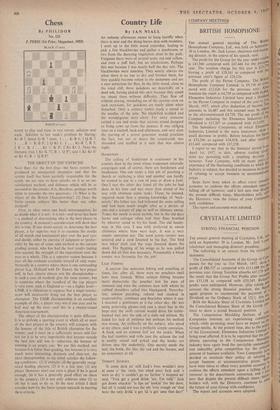Chess
By PHILIDOR No. 121
J. PERIS (1st Prize, Magasinet, 1953) RI %C. (7 men)
WWII. (8 men)
WHITE to play and mate in two moves: solution next week. Solution to last week's problem by Haring: Kt-B 7, threat Q-R 7 mate. 1 . . . K-B 4; 2 Q-R 7. 1...R x KB P; 2 Q-Kt I. 1 . . . Kt-R 7, R 5; 2 R x B. 1 . . . Kt x K P; 2 Kt-Kt 3. Note the thematic tries 1 Kt-K 7?, B x Q P!; and 1 Kt-Kt 6? or Kt 4?, B x QB P!
THE OBJECT OF THE EXERCISE Now that—for the first time—the Swiss system has produced an unexpected champion and that the system itself hat been partially responsible for the result, we are sure to have attacks on it as an un- satisfactory method, and defences which will be as unsound as the attacks. It is. therefore, perhaps worth while to consider the two questions : (1) What is the object of the British Championship? (2) Does the Swiss system achieve this better than any other method?
First, to clear away one basic misconception, let us decide what it is not : it is not—and never has been —a method of determining who is the best player in the country. A moment's consideration will show that this is true. If one wants merely to determine the best player, a far superior way is to examine the results of all match and tournament play over the past year and decide, either by exercise of judgment or (prefer- ably) by the use of some such method as the current grading system, who has had the best results (taking into account the strength of the opposition) over the year as a whole. This is a superior system because it uses all the evidence available instead of only some. Naturally in a country where there is one outstanding player (e.g., Holland with Dr. Euwe), the best player will, in fact, almost always win the championship— in such a case all methods give the same answer; but in countries where the standard of the top players is very even, such as England or—on a higher level— USSR, it is ridiculous to suppose that a single tourna- ment will necessarily bring out the best player as champion. The USSR championship is an excellent example of this; a player may win it one year and be half way up the next—and this in a twenty-round American tournament.
The object of the championship is quite different. It is to prJvide a sporting event in which all or most of the best players in the country will compete with the honour of the title of British champion for the winner; and it must be a sufficiently severe arid fair test for it to be very improbable that anyone outside the best few will win it—otherwise the honour of winning is an empty one. We use this method, not because it is fairer than grading, but because it is very much more interesting, dramatic and clear-cut. An ideal championship. to my mind, satisfies the follow- ing conditions: (1) It contains all the generally recog- nised leading players; (2) it is a fair test; (3) any player (however new) can earn a place if he is good enough; (4) it has a generally good effect on chess in the country; (5) it not only achieves aims (1) to (4) but is seen to do so. In' the next article I shall consider how far the Swiss system succeeds in meeting these criteria.






















































 Previous page
Previous page